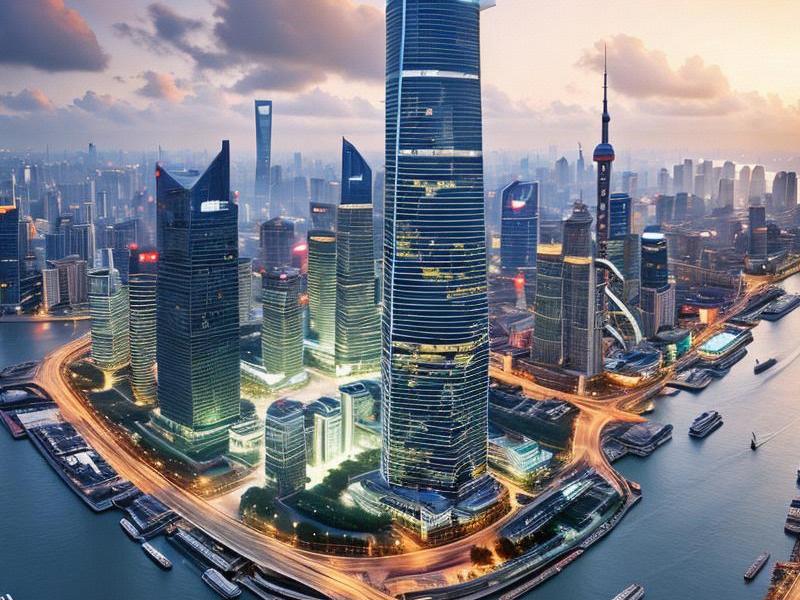
Shanghai, a name that resonates with the rhythm of modernity and the whispers of history, stands as a beacon of China's economic prowess and cultural vibrancy. This city, nestled along the banks of the Huangpu River, is not just a geographical entity but a living, breathing testament to the nation's journey towards modernization.
The story of Shanghai begins in the 19th century when it was forced open to foreign trade as one of the treaty ports. This marked the beginning of a new era for the city, as it became a melting pot of cultures and a hub for commerce. The Bund, with its colonial-era architecture, stands as a silent witness to this period of transformation. The juxtaposition of the historic skyline against the futuristic skyline of Pudong is a visual representation of Shanghai's ability to blend the old with the new.
Urban development in Shanghai has been nothing short of remarkable. The city has masterfully navigated the challenges of rapid urbanization while preserving its unique character. The Pudong New Area, once a rural landscape, is now a symbol of Shanghai's ambition and vision. Skyscrapers like the Oriental Pearl Tower, the Jin Mao Tower, and the Shanghai Tower dominate the skyline, showcasing the city's status as a global financial center.
The Lujiazui Financial District is the heart of Shanghai's economic activity. It is here that the world's tallest buildings vie for attention, and where the streets are abuzz with the energy of international business. The area's modern infrastructure, including the Maglev train and the metro system, makes commuting a breeze, ensuring that the city remains efficient and accessible.
Culturally, Shanghai is a treasure trove of traditional and contemporary art, music, and cuisine. The city's art scene has flourished, with galleries and museums like the Power Station of Art and the Shanghai Museum offering a glimpse into the rich artistic heritage of China. The Shanghai Symphony Orchestra and the Shanghai Ballet perform to packed houses, keeping the classical arts alive.
上海龙凤419油压论坛 Shanghai's culinary scene is equally diverse, reflecting the city's history as a port where people from all over the world came together. From the famous Xiaolongbao (soup dumplings) to the savory Shengjianbao (pan-fried dumplings), the city's food culture is a delightful journey for the taste buds. The bustling night markets and the elegant French Concession offer a variety of dining experiences, catering to every palate.
The city's commitment to sustainability and green development is also noteworthy. Initiatives like the construction of the Bund's waterfront promenade and the expansion of urban green spaces demonstrate Shanghai's dedication to creating a livable city. The city's efforts to reduce pollution and promote renewable energy are part of its broader strategy to become a model of sustainable urban development.
Shanghai's international influence extends beyond its economic and cultural achievements. The city has been a host to numerous international events, including the World Expo in 2010, which attracted millions of visitors from around the globe. These events have not only boosted the city's profile but also fostered a sense of global community.
The city's education system is another area of strength, with institutions like Fudan University and Tongji University attracting students from across the country and the world. These universities contribute to the city's intellectual capital and innovation, further solidifying Shanghai's position as a global leader.
上海贵族宝贝龙凤楼 However, the rapid pace of development has not been without challenges. Issues such as housing affordability, traffic congestion, and environmental concerns are being addressed through innovative solutions and policies. The city's government is committed to ensuring that the benefits of development are shared by all, and that the quality of life for its residents continues to improve.
Shanghai's people are the soul of the city. They are known for their entrepreneurial spirit, adaptability, and a deep sense of community. The city's cosmopolitan nature is reflected in its diverse population, with people from all walks of life contributing to its dynamic culture.
Tourism is a significant contributor to Shanghai's economy, with attractions like the Yu Garden, the Nanjing Road shopping district, and the Shanghai Zoo drawing visitors from far and wide. The city's ability to cater to the needs of tourists, whether they are seeking historical insights or modern entertainment, is a testament to its hospitality and service industry's sophistication.
In conclusion, Shanghai is a city that embodies the best of both worlds. It is a place where ancient traditions meet cutting-edge innovation, where the past and the future coexist harmoniously. As Shanghai continues to grow and evolve, it remains a source of inspiration and a model for other cities around the world.
上海贵族宝贝自荐419 The city's story is one of resilience, ambition, and a relentless pursuit of excellence. It is a story that continues to unfold, with each chapter revealing new layers of complexity and charm. Shanghai is not just a city; it is an experience, a journey into the heart of modern China and its aspirations for the future.
As we look towards the future, Shanghai's vision is clear: to remain a global leader in economic development, cultural exchange, and sustainable urban living. The city's commitment to innovation and its ability to adapt to the changing world will undoubtedly shape its destiny in the years to come.
Shanghai's story is a reminder that cities are not just physical spaces but living, evolving entities that reflect the hopes and dreams of their people. It is a story of how a city can rise from humble beginnings to become a global icon, a story that continues to inspire and captivate the world.
